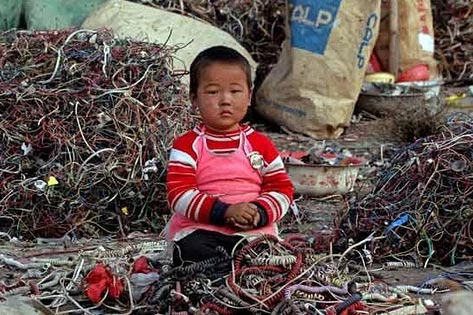Since the Senate couldn’t manage to pass a climate bill, this election day all eyes will be on California, where a ballot measure—Proposition 23—could make or break AB32, the country’s most aggressive law to cut planet-warming emissions. Supporters of Prop 23 say they’re just worried about the economy. They claim that reducing emissions could lead to the loss of 1.1 million jobs, cost the average small business more than $49,000, and “devastate budgets of California social service agencies” due to lost tax revenues. But the biggest spenders on the Prop 23 campaign have been out-of-state fossil fuel interests—hardly a disinterested party in the debate. So are their claims at all legit? Can cutting emissions really lead to a net loss of jobs?
The 2006 Global Warming Solutions Act, or AB32, requires that the state decrease emissions down to 1990 levels by 2020—an approximate 25 percent cut from current levels. Implementation of the plan is supposed to begin in 2011, but Prop. 23 would delay the start of the law until unemployment in the state falls below 5.5 percent and stays there for four consecutive quarters. Given the economic downturn around the country and the 12.8 percent unemployment rate in California, that could take quite a bit of time to pull off. (In fact, the state has only hit that goal three times since 1970—well before people were worrying about global warming.)
But there’s little evidence that cutting emissions would increase unemployment. A study released earlier this year by Navigant Consulting for the Renewable Electricity Standard Alliance indicated that a federal renewable electricity standard that required 25 percent of electricity come from renewable sources like wind and solar power could create 274,000 jobs nationally. A Congressional Budget Office study of federal proposals to cut greenhouse gases found only a “modest” impact on GDP. And while there would be job loss in the fossil fuel industry or other industries that are heavily reliant on those dirty energy sources, new jobs would be created in other sectors. Indeed, CBO concluded, the “churning of jobs that would be spurred by climate legislation would be small compared with what normally occurs.”
Economic forecasts in California back up these national findings. While enacting AB32 could cause job loss in some sectors, most independent experts actually forecast growth in jobs in the renewable energy, transportation, and efficiency sectors. In fact, green jobs are pretty much the only sector growing in the Golden State. The number of green jobs grew 36 percent in California between 1995 and 2008. The rate of growth for regular old jobs was only 13 percent. The opponents of the climate law note the growth in green jobs in their own fact sheets, while simultaneously stating that the state has lost 1.3 million jobs since the recession began in 2007—a fact hardly attributable to the climate law, considering it hasn’t yet got into effect.
What’s more, the California Air Resources Board (CARB) estimates that implementation of the law will actually save energy consumers in the state $7.5 billion through efficiency measures like homes and appliances that use less power. Indefinitely putting off action would only be worse for the state; a group of 118 economists with expertise in California energy and climate issues released a statement of support for the law in July, emphasizing that “Delaying action now will be more costly than initiating action now.”
And even though it hasn’t taken effect yet, the climate law has already been a boon to some small businesses in the state: Since it was passed in 2006, almost $11.6 billion has been invested in new clean-tech industries, according to a report from Small Business Majority. A report from CARB anticipates a net increase in income of $4.6 billion for small businesses by 2020, and the creation of at least 15,000 new jobs.
If you take a look at who’s funding the ballot measure, it’s not hard to see where their motivations lie. The campaign to delay the law has been largely funded by out-of-state oil interests. Texas-based Valero contributed $4 million, fellow Lone Star State giant Tesoro gave $1.5 million, and a refinery owned by the notorious Kansas-based billionaire brothers David and Charles Koch, of Koch Industries, kicked in another $1 million. Houston-based Marathon oil contributed $500,000. Tesoro and Valero’s CEOs co-wrote an op-ed arguing that they’re just worried about their 4,000 employees in California.
That’s not to say the folks in support of the global warming law are entirely unbiased. The “No on Prop. 23” crowd has $28 million in the bank, much of that from the tech world—$5 million of that is from former Farallon Capital Management partner Tom Seyer. VC giant John Doerr gave $2 million, and hefty checks also came from former Sun Microsystems CEO Vinod Khosla ($1 million), former Intel CEO Gordon Moore ($1 million) and Google CEO Eric Schmidt’s wife Wendy Schmidt ($500,000). There are clearly plenty of folks in California who think the law would be an economic boon for their industries—specifically in the technology sector, which is banking on selling us new forms of energy and gadgets that can help the US use energy smarter.
All this said, the climate law isn’t a silver bullet for California’s unemployment problem, despite all the hype about green jobs. Right now, less than 1 percent of the state’s workforce is employed in a green jobs, as the California policy group Next 10 found in a recent report. As the Sacramento Bee recently noted, “putting to work even a tenth of California’s unemployed over the next three years would require green job numbers to grow 17 times more quickly [than the current growth rate].”
The state’s employment situation is in fact bleak. But vilifying the state’s climate law is also far from the answer to the state’s job woes, and the oil companies’ campaign against cutting emissions hasn’t done a very good job of convincing anyone that they’re objective players with innocent concerns about employment. Perhaps the Governator put it best in remarks a few weeks ago: “Does anyone really believe that these companies out of the goodness of their black oil hearts are spending millions and millions of dollars to protect jobs?”
Got a burning eco-quandary? Submit it to econundrums@motherjones.com. Get all your green questions answered by visiting Econundrums on Facebook here.















